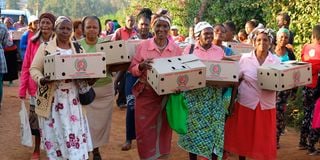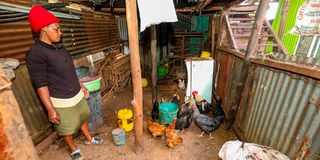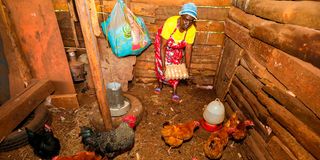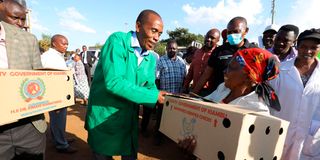Premium
Kiambu chicken project that empowers women, feeds children

Women in Uthiru Ward, Kabete in Kiambu County in Kiambu, on August 23, 2023, after collecting one-month-old improved kienyenji chicks distributed by the county.
What you need to know:
- The county has approximately 36,000 ECDE children attending 534 public centres.
- Each child is provided with three eggs per week as part of their diet.
Lucy Wanjiru’s life is a testament to the transformative power of perseverance and determination.
Ms Wanjiru was a struggling resident of Riabai ward in Kiambu Township sub-county. But her life took a dramatic turn when she joined a Kiambu County government agricultural programme aimed at empowering women through poultry farming.
With determination burning in her heart, Ms Wanjiru wasted no time in seizing the opportunity. After hearing that the county government was giving out free improved kienyeji chicks sourced from the Kenya Agricultural and Livestock Research Organisation to farmers, she accompanied fellow villagers to the venue of the exercise. After short speeches, her moment came.

Lucy Wanjiru not only has sufficient eggs for her family, she sells the surplus.
With words of encouragement, Governor Kimani Wamatangi handed her a carton of the fluffy chicks. And with hope gleaming in her eyes, Ms Wanjiru headed back home, clutching the precious cargo that would soon become the seed of her success.
“I rarely attend public meetings, even if they are held outside my residence, but this time, I was determined to be part of the group receiving the chicks. Once I got my share, I walked home ready to start a new journey as a poultry farmer. Six months down the line, I am proud of my achievements,” she says.
In a quiet corner of her modest homestead, she nurtured her chicks in a simple coop, watching with pride as they grew. With careful attention to detail and guidance from by county agricultural extension officers, the brood flourished. What started as a small flock quickly multiplied, and she found herself harvesting eggs for her family and supplying the surplus to others.
Ms Wanjiru’s journey mirrors that of hundreds of women across Kiambu County who have embraced the program. Receiving 10 chicks each, these women have turned their modest beginnings into thriving enterprises. Through dedication and hard work, they have secured not only a steady source of income but also elevated their status within their communities.
Ms Florence Waithera, a resident of Ndumberi, is among the over 34,000 women in the county who have received close to 200,000 chicks. She says she has mixed the donated chicks with her local breed to improve the local ones.
“This particular breed (from Kalro) matures. In just over six months, I have about 50 chickens from the original five that I received from the county government,” Ms Waithera tells Seeds of Gold in an interview.

Florence Waithera, a one-month old kienyeji chicks beneficiary from Ndumberi Ward, in Kiambu County.
Another beneficiary, Ms Regina Wairimu, says that the improved kienyeji breed adapts well to the cold weather.
“Unlike the previous breed that I reared, these hybrid chicks have adapted well even in the cold season when most of the chickens become susceptible to diseases,” she says.
When the county government initiated a school feeding programme for Early Childhood Development Education (ECDE) centres, it created an opportunity. Recognising the nutritional value of eggs, the government decided to provide an egg daily to each learner, thus roping in the women who had been rearing chickens.
“Once we conceived the idea of introducing the feeding programme for our nursery schools, I was surprised that there was a shortage of eggs. Eggs had to be sourced from neighbouring counties. We decided that we need to empower our women to become egg suppliers,” says the governor.
The county has approximately 36,000 ECDE children attending 534 public centres. Each child is provided with three eggs per week as part of their diet, amounting to 108,000 eggs per week. Over a 13-week term, the county requires 1,404,000 eggs, which costs Sh18 per egg, including delivery expenses. This equates to an income of Sh18,272,000 per term for the local farmers.
“We are preparing these farmers to be our suppliers of eggs. Once the chicks have matured, laid eggs and hatched, we expect the farmers not to have less than 40 chickens. These can lay up to 30 eggs per day and 140 per week. With the Sh18 that we are buying an egg, it means that they will be earning Sh3,780 per week. This is what we call economic empowerment,” Mr Wamatangi said.

Kiambu Governor, Kimani Wamatangi distributing one-month old kienyeji chicks to poultry farmers in Kabete Sub-County.
According to Agriculture, Livestock and Fisheries Chief Officer John Kuria, it is a win-win scenario.
“This programme is akin to killing two birds with one stone; we are empowering our women while making them suppliers of eggs to our ECDE centres,” Mr Kuria said.
“Despite initial skepticism from critics, the results speak volumes. Hundreds of women who have benefited are living testimonials of its efficacy.”





